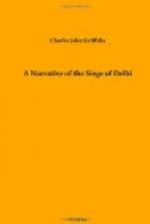June 23.—On reaching Umballah, we found the station all but deserted, nearly all the European troops having been sent on to join the Delhi force. The church had been placed in a state of defence, all its walls loopholed, and around it had been constructed a work consisting of a wall and parapet, with towers of brickwork armed with field-pieces en barbette at the angles.
In it were quartered some of the 1st Bengal Fusiliers, lately brought down from Dagshai. About ninety of these marched with us to Delhi. Here also we were joined by four officers of the (late) 57th Native Infantry, who had received orders to join our wing, eventually to fill up vacancies in the native corps on reaching the scene of operations. With these we were in all twenty-four officers—rather a strong complement even for a whole regiment.
The concluding days of the march were trying in the extreme. Weary and footsore, and often parched with thirst, we tramped along the hot and dusty roads, often for miles up to our ankles in deep sand. We were so tired and overcome with want of rest that many of us actually fell fast asleep along the road, and would be rudely awakened by falling against others who were in the same plight as ourselves. At midnight we rested, when coffee and refreshment were served out to the officers and men. The halt sounded every hour, and for five minutes we threw ourselves down on the hard ground or on the hot sand and at once fell asleep, waking up somewhat restored to continue our toilsome journey.
From Jugraon onward we had rather long marches, and it was considered advisable to convey the men part of the way in hackeries; the arrangement being that they should march halfway, then halt for coffee and refreshment, and afterwards ride the remainder of the distance.
By this means they were kept fresh for the work before them, which, we had every reason to believe, would be anything but light. At Umballah I took the opportunity of calling on my friend Mr. George Barnes, the Commissioner of the Cis-Sutlej States. He had shown me boundless hospitality, and was like a father to me when I joined my regiment as a lad at Kussowlie. A man of great intellectual attainments and sound judgment, he was an honour to the Bengal Civil Service. There was no officer at that momentous period in whom Sir John Lawrence placed more confidence. His familiarity with the native character, and the friendship borne towards him by the Sikh chieftains, enabled him throughout the Siege of Delhi to keep open communication with the Punjab, and supply the force with stores, provisions, and ammunition. He would, without doubt, have risen to the highest honours in his profession had he not been stricken with a fatal illness in 1859, when holding the responsible post of Foreign Secretary to the Government of India.
A few marches from Delhi we passed over the historic field of Paniput, where three sanguinary battles had been fought in different ages, each deciding the fate of Hindostan for the time being. More than 100,000 men had been slain in these actions, and we felt we were marching over ground the dust of which was thickly permeated with the ashes of human beings.




